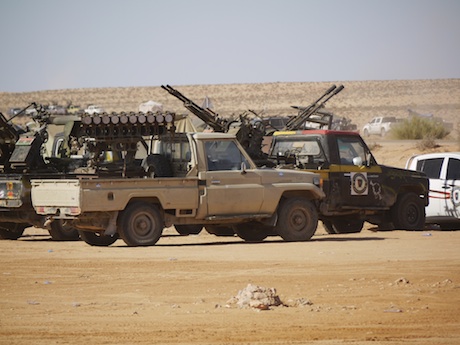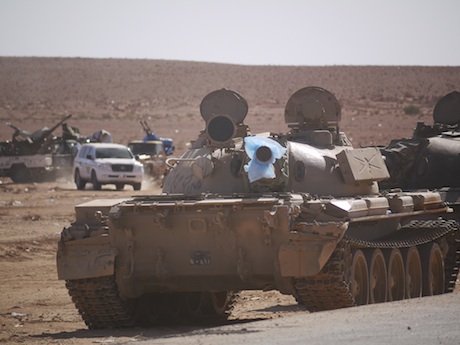By George Grant.

Bir Dufan, 4 October:
Revolutionary brigades from across Libya have joined the Libya Shield and the National Army at four . . .[restrict]camps surrounding the former Qaddafi stronghold of Bani Walid, with commanders preparing for an assault as early as Saturday.
Today, the Libya Herald visited the frontline base at Bir Dufan and found more than one thousand soldiers camped in the desert spanning an area of perhaps half to one square kilometre.
Tents had been erected adjacent to some 200 flatbed 4x4s fitted with an array of heavy machineguns and mounted rocket launchers. Soldiers at the camp claimed five tanks and five Grad multiple rocket launchers were positioned down the road towards Bani Walid, some 50km southwest, although commanders refused to verify this number.
One tank could be seen on raised ground on the horizon, however, whilst three more were visible inside the main camp itself.
The majority of forces at Bir Dufan hailed from Misrata, although brigades from nearby towns including Khoms and Zliten were also present. Further east, a camp said to be still larger has been assembled by brigades from Benghazi and the surrounding areas on the road from Sirte.
Forces from the Nafusa Mountains are situated on the road running south from Bani Walid whilst forces from Tripoli and the surrounding areas have shut off the last remaining road running northwest towards Tarhuna and the capital.
“We are ready to advance but we are still waiting for a political solution”, said Colonel Mohammed Musr, head of the Misrata Military Council and commander of the camp at Bir Dufan. “We don’t want anyone to die”.
Nevertheless, with rocket launchers and machine guns being ominously and intermittently test-fired, Musr admits that the chances of a negotiated settlement being reached with Bani Walid are narrowing. “There are no negotiations with Bani Walid at present”, he said, although this claim has been contradicted by leaders in Tripoli.
On Tuesday forces from this camp clashed with militia from Bani Walid in the Mordum area some 30 kilometres forwards from Bir Dufan.
“Forces from Bani Walid approached our base so we intercepted them”, Musr said. “Nobody was killed on our side, nor did we suffer any casualties as a result of enemy fire.”
He said that a handful of men were injured in accidents during the fighting, including one who caught his fingers in the bolt of his machinegun. One man from Bani Walid is reported to have been killed, and an unknown number wounded.
No clashes have yet been reported by any of the other three camps.
In the scorching heat outside the commanders’ tent, the mood was at once both drowsy and chaotic. For hundreds of metres in every direction, soldiers could be found eating, sleeping, chatting, and in almost every case taking refuge from the sun in tents or on sheets strung from the sides of vehicles.
Nobody, not even those in charge, was able to put a precise figure on how many men had been assembled, nor did there appear to be any discernable logic governing how the camp was organised. The new model army this was not.
What this ragtag mixture of brigades lacked in organisational wherewithal, however, was compensated for in terms of raw firepower and combative spirit.

It is not known how many forces Bani Walid has at its disposal, but few believe the town can match what is now ranged against it.
“Bani Walid has refused to negotiate and there is going to be a fight” said one brigadesman from Misrata’s Jamshaik brigade, a sentiment shared by the majority of his peers. “We do not believe they can win”.
The soldier, who requested not to be named, said that there was a deep anger with Bani Walid at its continued defiance of the new government and the string of kidnappings that have taken place in recent weeks and months.
Local activists say that four Misratans are currently being held in Bani Walid, and soldiers at the camp have reported new kidnappings in the past few days.
“On Tuesday, after the fight, Bani Walid kidnapped five teenagers from Zliten and they are still being held”, he said. “They were just boys.”
It is understood that the boys in question had ventured towards Bani Walid believing that the army was further forwards than it was and had fallen into enemy hands. Shortly after the clashes, the government forces had withdrawn back to the main camp at Bir Dufan.
Indeed, the catalyst for the current crisis was the death last Tuesday of Omran Shaban, the Misratan revolutionary credited with first discovering Muammar Qaddafi in a drainpipe in Sirte last October.
He was kidnapped in Bani Walid together with a colleague in July, having been dispatched to the town following the abduction of two prominent Misratan journalists four days earlier.
Shaban was shot and, it is alleged, severely tortured over the course of his two month detention before eventually being released on 13 September following mediation efforts led by National Congress President Mohamed Magarief.
On the day of Shaban’s death, the Congress issued an ultimatum to Bani Walid to hand over those involved and authorised the ministries of defence and interior to utilise all necessary measures to bring the suspects to justice.
The ten-day deadline given to Bani Walid to comply expires tomorrow, Friday, and soldiers at Bir Dufan say they have been told to prepare for an assault on Saturday if a settlement is not reached.
In Misrata, where an enormous black flag can found flying at half mast in remembrance of Shaban, Saturday is also being given as the day when any attack will most likely begin.
“If Bani Walid does nothing then Saturday is the day”, Mohamed Zarmouth, the man in charge of Misrata’s military communications room, told the Libya Herald.
“After Friday we wait for the call [from Chief of Staff Yusuf Mangoush]. I suspect a move may be ordered on Saturday afternoon or evening”.
In Bani Walid itself, the mood seems equally resigned. “We are waiting for them to come”, said a lawyer in the town who asked not to be named. “They have now stopped any fuel from getting here”.
The man refused to provide an estimate of how many forces Bani Walid had at its disposal, but said that many ordinary citizens such as himself were preparing to fight. Other civilians are also said to have begun evacuating the town.
This evening, however, the leader of the loyalist Bani Walid Local Council in Tripoli said that delegations were continuing efforts to reach a negotiated settlement, with Magarief today requesting that Congress extend the deadline until 10 October.
“A delegation returned from there yesterday and another delegation was there today”, said Mohammed Bashir.
“I do not believe that an attack will be ordered on Saturday, but I have to say that expectations for successful negotiations are not high at this stage”. [/restrict]







